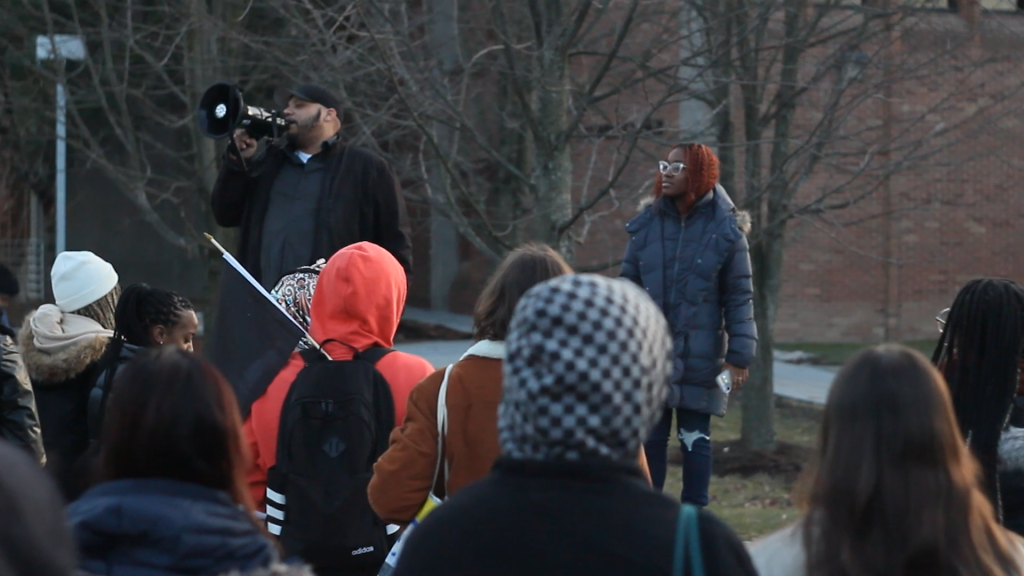“No Justice, No Peace,” echoed around Binghamton University as students and community members marched in solidarity for Tyre Nichols.
On Feb. 8, the Black Student Union (BSU) organized a march and rally for Tyre Nichols, a 29-year-old Black man who was beaten by Memphis Police Department officers and died days later. The protest started in front of the MarketPlace, with members of the BSU leading a moment of silence for Nichols. It was followed by an open mic, where BSU members and other students were given opportunities to speak. Organizers passed out black flags with the names of Black Americans who were killed by police. Protesters then marched down the Spine through the Lecture Hall and Glenn G. Bartle Library, stopping periodically to remember past victims of police violence.
The march occurred nearly a month after Nichols’ death. On Jan. 7, Nichols was stopped by Memphis police for what the department initially claimed was reckless driving. The traffic stop then violently escalated, resulting in Nichols being punched, kicked and beaten with a baton for nearly three minutes after being pepper-sprayed and tased. Nichols was taken to the hospital in critical condition and died three days later from excessive bleeding, according to an autopsy commissioned by the Nichols family.
One of the organizers of the protest was Taylor Chance, BSU’s political correspondent and a sophomore majoring in integrative neuroscience. Chance described the importance of this march as an opportunity to raise awareness, build solidarity and honor victims of police brutality throughout recent history.
“A man lost his life unnecessarily and unjustly,” Chance wrote in an email. “This has been an ongoing problem and there seems to be no correction. The whole nation should be in outrage, cities should be marching and protesting because [Nichols] could’ve been any of us. However, I guess since he was Black, like many victims of police brutality, the nation can’t empathize with this plight.”
The death of Nichols has also sparked protests in Memphis and around the United States following the release of police body camera footage. Five Memphis police officers who were involved in the beating were later fired, arrested and charged with various felonies, including second-degree murder and aggravated assault.
Chance listed a variety of police reforms that could be implemented, including laws that reduce usage of excessive force, increase accountability and programs that encourage community policing and social services.
“The current police system has been built on anti-Black legislation and policies,” Chance wrote. “It prioritizes the use of force over alternative approaches like community policing and social services. Police officers receive inadequate training in de-escalation techniques, mental health and diversity. A complete overhaul of the system is not just a demand at this point. It is a necessity to address these deeply ingrained biases and to ensure that policing is fair and just for all.”
The BSU’s march ended in the University Union, with final remarks urging change and reform in police departments across the country.
One protestor, Hanson Cofie, an undeclared sophomore, said he felt compelled to participate after learning about the protest on Instagram.
“There was a feeling that I had to come out and protest,” Cofie said. “Every step I took, I was thinking about [Nichols]. I was thinking that could be anyone, that could my family members. That could be the friends I made here. That could’ve been me.”
Another protester, Vanessa Padilla, a junior majoring in economics, also learned about the protest through a Instagram post and shared it with her friends and classmates. A member of the Latin American Student Union, she described being encouraged by other members to participate in the rally.
“I feel we keep coming out here preaching, ‘No justice, no peace,’ and we will continue to come out here speaking our truths and our feelings,” Padilla said. “If they do not want to hear, we [will] just keep on going.”



